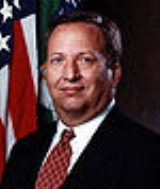
Lawrence Summers
Lawrence Henry "Larry" Summers (born November 30, 1954) is an American economist and the head of the White House's National Economic Council for President Barack Obama. Summers is the Charles W. Eliot University Professor at Harvard University's Kennedy School of Government. He is the 1993 recipient of the John Bates Clark Medal for his work in several fields of economics and was Secretary of the Treasury for the last year and a half of the Bill Clinton administration. Summers also served as the 27th President of Harvard University from 2001 to 2006. Summers resigned as Harvard's president in the wake of controversy over a talk in which he speculated that women may have lesser aptitude for work in the highest levels of math and science. Summers has been criticized by some liberals for the centrist economic policies he advocated as Treasury Secretary and in later writings.
Sourced
- ...it’s important to remember how fortunate we are as a country to have a currency and a bond market that is seen in every way as a source of strength and it’s a huge responsibility for us to keep it that way.
- Tom Braithwaite (April 9, 2009) "Summers sees end to ‘sense of free-fall’", Financial Times
- With uncertainty in oil markets, a buildup of speculative pressures and the large U.S. current account deficit, there is a real possibility that Paulson's crisis-management skills will be tested.
- David Ignatius (May 31, 2006) "Watching the Yellow Flags", The Washington Post, p. A19.
- I know that there is one additional thing that I've learned and that is that what Harvard does and says has an enormous resonance that goes beyond Zip code 02138.
- Philip Kennicott (April 15, 2005) "The Man in The Ivory Tower - Harvard's Lawrence Summers Is a Study in Controversy" The Washington Post, p. C1.
- I deeply regret the impact of my comments and apologise for not having weighed them more carefully ... I was wrong to have spoken in a way that has resulted in an unintended signal of discouragement to talented girls and women.
- Apology letter addressed to Harvard University community, posted on his website — reported in Reuters (January 26, 2005) "Summers Regrets", The Australian, p. 032.
- We must recognise that in an integrated world, trade cannot be divorced from other concerns. We need to promote free trade and serious global efforts with respect to common problems even as we support every nation's right to chart its own course.
- Statement made at World Economic Forum — reported in Muihoong (February 1, 2000) "China trade vote a key test, says Summers", The Straits Times, p. 9.
- The situation in a number of countries reminds one that it's still a risky world out there in the emerging markets.
- Michael M. Phillips, The Wall Street Journal (April 16, 1999) "Global Economic Crisis In Its Last Days", Pittsburgh Post-Gazette, p. C-1.
- Where countries have been able to carry through on their reform commitments -- as in Korea, Thailand and the Philippines -- results are starting to come in the form of lower interest rates, new investment and increased growth.
- David Ignatius (April 12, 1999) "Clinton's Capitulation on China", The Washington Post, p. A23.
- No free country will ever again have anything like the 90 percent tax rates that we had in this country. Past a certain point, high marginal tax rates are, indeed, terribly destructive.
- David Wessel, The Wall Street Journal (April 5, 1998) "Rich now pay more in taxes", Mobile Register, p. F1.
- Things take longer to happen than you think they will and then they happen faster than you think they will.
- David Warsh (February 11, 1992) "Avoiding Weimar Russia", Boston Globe, p. 37, Section: Business.
- Takeovers wouldn't cause the stock market to rise unless there is an upward reassessment of earnings (potential). People are more optimistic and confident about the future.
- Glenn Pascall (August 16, 1987) "Raiding Can Be Seen As Wake-Up Call For Corporate America", The Seattle Times, p. B4.
- The things you hear now about European unemployment -- that there are structural problems, that real wages have failed to adjust, that there are inflationary fears -- are the same things that were said during the early 1930. It is well established that government spending began to pull Germany out of its slump in 1935. There is no known reason why spending for peace can't do as well at getting the economy going as spending for war.
- David Warsh (April 27, 1986) "It Did Happen Here, Too", Boston Globe, p. A1.
- The country will not have to pay the piper. Through a combination of sound policy actions and a great deal of good luck we are well on our way to a soft landing and a period of growth and price stability.
- David Warsh (April 20, 1986) "Stockman's Timing Was Never Worse", Boston Globe, p. A1.
